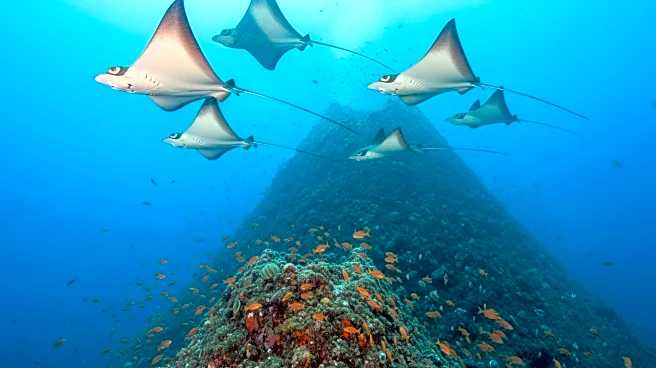What's Happening?
Researchers have uncovered a massive nursery of giant skate ray eggs on an active underwater volcano off Vancouver Island. This discovery was made by a team from Fisheries and Oceans Canada, who initially set out to explore a seamount thought to be geologically dormant. The volcano, which rises over 3,600 feet from the ocean floor, was found to be active, emitting mineral-rich hot water that supports a diverse marine ecosystem. The most remarkable finding was the presence of hundreds of thousands, potentially over a million, skate ray eggs deposited at the summit of the volcano. These eggs, encased in protective structures, highlight unique reproductive strategies adapted to the extreme conditions of the deep sea. The volcanic heat is believed to play a crucial role in aiding the development of these marine creatures, providing a warm environment that serves as a natural incubator.
Why It's Important?
The discovery of this skate ray nursery underscores the intricate connections between geological and biological systems in the deep sea. It highlights the resilience and adaptability of marine life, showcasing how species have evolved to utilize geothermal heat for survival. This finding is significant for conservation efforts, as it emphasizes the need to protect fragile deep-sea ecosystems from threats such as deep-sea mining and climate change. The nursery serves as a reminder of the vast unexplored realms beneath the ocean surface and the potential for further revelations about marine life. Understanding these ecosystems is crucial for maintaining the delicate balance that sustains life on Earth, and it calls for responsible exploration and global cooperation to preserve these natural wonders.
What's Next?
The discovery opens up new avenues for scientific research into the adaptation and evolution of marine species in extreme environments. Scientists are likely to continue exploring this underwater volcano to gain deeper insights into the complex interactions between geological activity and marine biodiversity. The findings may also prompt discussions on the implementation of protective measures for deep-sea ecosystems, balancing exploration with conservation. As researchers delve further into these depths, they may uncover additional secrets of marine life, contributing to a broader understanding of the ocean's role in Earth's ecological systems.
Beyond the Headlines
This discovery highlights the ethical and environmental considerations of deep-sea exploration. The potential for deep-sea mining poses a significant threat to these ecosystems, raising questions about the balance between resource extraction and conservation. The findings also emphasize the importance of international collaboration in protecting the ocean's biodiversity, as these ecosystems do not adhere to national boundaries. The study of such unique environments can provide valuable insights into the resilience of life, informing broader ecological and evolutionary theories.









